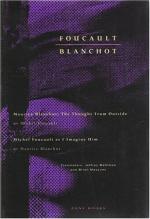|
This section contains 3,831 words (approx. 13 pages at 300 words per page) |

|
SOURCE: “A Mosaic View: The Poetics of Maurice Blanchot,” in The Literary Review, Vol. 21, 1978, pp. 425-38.
In the following essay, Champagne discusses the influence of Judaic thought and biblical paradigms on Blanchot's philosophy of language. In particular, Champagne considers the poststructuralist literary theory with which Blanchot associates literary space with the Promised Land, literary text with scripture, and the writer-reader relationship with that of a sacred covenant.
“For the writer, the genuine responsibility is to support literature as a commitment not yet realized, as a Mosaic view of the Promised Land of reality.”
—Roland Barthes, Tel Quel No. 5
Maurice Blanchot has been writing French philosophical and critical literary essays for some thirty years. Some would have him be “a hidden center of 20th century fiction and criticism.”1 Especially in the last decade, Blanchot has provided the philosophical bases for the creative work of the French “new novel” of...
|
This section contains 3,831 words (approx. 13 pages at 300 words per page) |

|


